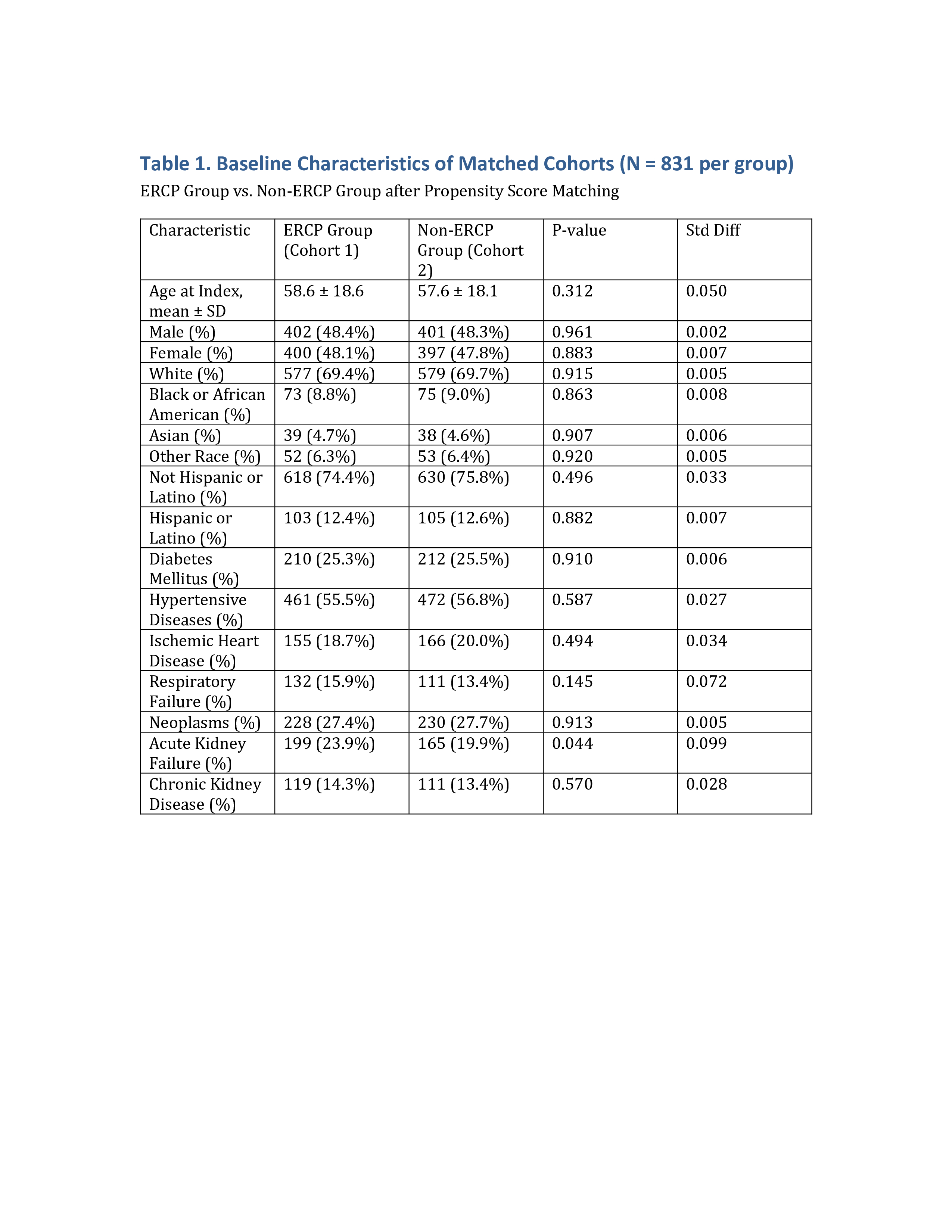Tuesday Poster Session
Category: Biliary/Pancreas
P4351 - Does ERCP Worsen Outcomes in Sterile Necrotic Acute Pancreatitis? Insights From a Real-World 90-Day Analysis
Tuesday, October 28, 2025
10:30 AM - 4:00 PM PDT
Location: Exhibit Hall

Ali Osman, MD, MSCI Candidate
Washington University School of Medicine in St. Louis
Ballwin, MO
Presenting Author(s)
Ali Osman, MD, MSCI Candidate1, Mohamed Abdallah, MD2
1Washington University School of Medicine in St. Louis, Ballwin, MO; 2Corewell Health, Royal Oak, MI
Introduction: The implications of endoscopic retrograde cholangiopancreatography (ERCP) in the management of acute pancreatitis (AP) with sterile necrosis are not well established. While ERCP is indicated in cases of infected necrosis or biliary obstruction, its utility in sterile necrosis is less defined.
Objective:
To evaluate the clinical outcomes of ERCP in patients with AP and sterile necrosis compared to those managed conservatively.
Methods: We conducted a retrospective propensity score–matched cohort study using the TriNetX Global Collaborative Network. Adults (≥18 years) with a diagnosis of acute pancreatitis and radiographically confirmed sterile necrosis were identified. Patients were divided into two matched cohorts: those who underwent ERCP (n=831) and those who did not undergo ERCP (n=831). Individuals with infected necrosis, chronic pancreatitis, or any ERCP procedure in the control group were excluded. Outcomes were assessed over 180 days following the index diagnosis. Analyses included risk differences, hazard ratios, and Kaplan-Meier survival estimates.
Results: In matched cohorts (n=831 each), mortality rates were slightly higher in the ERCP group (13.2% vs 11.8%; risk difference 0.014 [95% CI: -0.017, 0.046]; p=0.374), with similar survival at 180 days (84.8% vs 86.6%; HR: 1.092 [95% CI: 0.832, 1.434]; p=0.524). Rates of sepsis were slightly lower in the ERCP group (6.9% vs 8.3%; p=0.266), with comparable survival (92.3% vs 90.7%; HR: 0.802; p=0.217). Hospital visits occurred in 20.6% of ERCP patients vs 18.4% controls (p=0.265). Infected necrosis was rare (1.2% vs 1.8%) and did not differ significantly between groups (p=0.314), although Kaplan-Meier analysis showed a statistically significant survival benefit in the ERCP group (99.5% vs 98.0%; HR: 0.256 [95% CI: 0.085, 0.771]; p=0.009).
Discussion: In patients with AP and sterile necrosis, ERCP was not associated with significant differences in mortality, sepsis, or hospitalization rates. However, a potential survival benefit was observed regarding the development of infected necrosis. Further prospective studies are warranted to clarify the implications of ERCP in this patient population.

Figure: Table 1. Baseline Characteristics of Matched Cohorts (N = 831 per group)

Figure: Fig-1: Forest Plot of Outcomes: ERCP Group vs Non-ERCP Group
Disclosures:
Ali Osman indicated no relevant financial relationships.
Mohamed Abdallah indicated no relevant financial relationships.
Ali Osman, MD, MSCI Candidate1, Mohamed Abdallah, MD2. P4351 - Does ERCP Worsen Outcomes in Sterile Necrotic Acute Pancreatitis? Insights From a Real-World 90-Day Analysis, ACG 2025 Annual Scientific Meeting Abstracts. Phoenix, AZ: American College of Gastroenterology.
1Washington University School of Medicine in St. Louis, Ballwin, MO; 2Corewell Health, Royal Oak, MI
Introduction: The implications of endoscopic retrograde cholangiopancreatography (ERCP) in the management of acute pancreatitis (AP) with sterile necrosis are not well established. While ERCP is indicated in cases of infected necrosis or biliary obstruction, its utility in sterile necrosis is less defined.
Objective:
To evaluate the clinical outcomes of ERCP in patients with AP and sterile necrosis compared to those managed conservatively.
Methods: We conducted a retrospective propensity score–matched cohort study using the TriNetX Global Collaborative Network. Adults (≥18 years) with a diagnosis of acute pancreatitis and radiographically confirmed sterile necrosis were identified. Patients were divided into two matched cohorts: those who underwent ERCP (n=831) and those who did not undergo ERCP (n=831). Individuals with infected necrosis, chronic pancreatitis, or any ERCP procedure in the control group were excluded. Outcomes were assessed over 180 days following the index diagnosis. Analyses included risk differences, hazard ratios, and Kaplan-Meier survival estimates.
Results: In matched cohorts (n=831 each), mortality rates were slightly higher in the ERCP group (13.2% vs 11.8%; risk difference 0.014 [95% CI: -0.017, 0.046]; p=0.374), with similar survival at 180 days (84.8% vs 86.6%; HR: 1.092 [95% CI: 0.832, 1.434]; p=0.524). Rates of sepsis were slightly lower in the ERCP group (6.9% vs 8.3%; p=0.266), with comparable survival (92.3% vs 90.7%; HR: 0.802; p=0.217). Hospital visits occurred in 20.6% of ERCP patients vs 18.4% controls (p=0.265). Infected necrosis was rare (1.2% vs 1.8%) and did not differ significantly between groups (p=0.314), although Kaplan-Meier analysis showed a statistically significant survival benefit in the ERCP group (99.5% vs 98.0%; HR: 0.256 [95% CI: 0.085, 0.771]; p=0.009).
Discussion: In patients with AP and sterile necrosis, ERCP was not associated with significant differences in mortality, sepsis, or hospitalization rates. However, a potential survival benefit was observed regarding the development of infected necrosis. Further prospective studies are warranted to clarify the implications of ERCP in this patient population.

Figure: Table 1. Baseline Characteristics of Matched Cohorts (N = 831 per group)

Figure: Fig-1: Forest Plot of Outcomes: ERCP Group vs Non-ERCP Group
Disclosures:
Ali Osman indicated no relevant financial relationships.
Mohamed Abdallah indicated no relevant financial relationships.
Ali Osman, MD, MSCI Candidate1, Mohamed Abdallah, MD2. P4351 - Does ERCP Worsen Outcomes in Sterile Necrotic Acute Pancreatitis? Insights From a Real-World 90-Day Analysis, ACG 2025 Annual Scientific Meeting Abstracts. Phoenix, AZ: American College of Gastroenterology.
